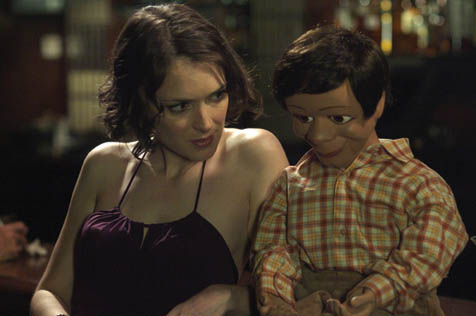The Ten
Non-Bible Lessons

The Ten. Winona Ryder, Gretchen Mol, Jessica Alba, and Paul Rudd star in a film written by Ken Marino and David Wain and directed by Wain.
In 1989, the late, great Polish director Krzysztof KieÅlowski released a 10-part television series called The Decalogue, in which he addressed the lessons of the Ten Commandments in as many episodes. The series translated beautifully to the big screen and is considered one of the cinematic masterpieces of the last quarter-century.
And for something similar, but completely different: The Ten, a trashy little romp of a comedy, is an irreverent, often fashionably crude, and occasionally outlandishly creative spin on the same theme. Ten chapters take on all the “Thou shalt” decrees, interspersed with structural Greek chorister bits starring Paul Rudd and Famke Janssen, who later get folded into the main body of the plot.
Of course, the relationship between this new morsel of comic ludicrousness and the KieÅlowski project is analogous to a whoopee cushion versus a religious epiphany. In this landscape of loosely based Bible lessons, we encounter such twistedness as two married, male prison inmates, a parachute accident victim who becomes a TV celebrity, a surgical gag-turned-fodder for the “thou shalt not murder” clause, and a male nudist club in the ‘burbs who meet every Sunday.
One of the film’s tastiest pleasures is getting a chance to see Winona Ryder in action again, acting in the offbeat comic mode in which she excels and has since she hit the screen in the dark-horse comic classic Heathers in 1989. In Ryder’s skit, under the “Thou shalt not steal” rubric, she plays a woman on her honeymoon who falls prey to the come-on seduction of a ventriloquist’s dummy. She becomes obsessed with this mute, wooden lover in a wicked and bizarrely funny bit.
But while The Ten takes its place alongside the current bumper crop of ribaldry in the obscene-yet-feel-good Knocked-Up genre, and its narratives never stray very far from jokes about genitalia and potties, writer/director David Wain’s comedy has the distinction of leaning into the winds of absurdity. All in all, we see things we never would have heard of in the Bible.



